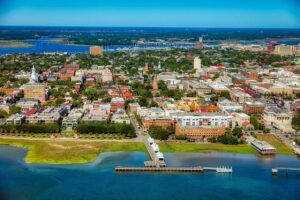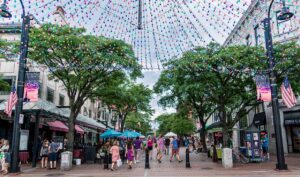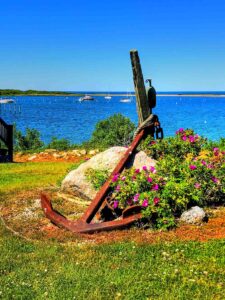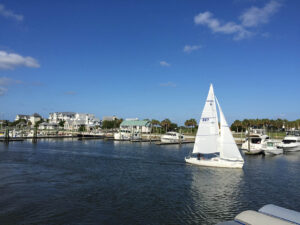It’s a bit painful for me to write this — painful the way it is when you’ve got a really good secret and don’t want to divulge it but know you must. Because here’s the thing: A trip to the tropical isles of Culebra and Vieques — nestled between Puerto Rico and St. Thomas, and collectively known as the Spanish Virgin Islands — is one of the most charming, stunning and bafflingly underrated Caribbean jaunts to be had.
And now that the venerable charter company The Moorings has set up shop in Fajardo on the main island of Puerto Rico, it couldn’t be easier to execute. Remember that there are loads of affordable flights from the U.S. to Puerto Rico, you do not need a passport to travel there, the currency is the American dollar and your cell phone will work on its normal plan just fine. Though I suggest ignoring your phone while you’re there, lest you miss a single second of the experience. For our own adventure, we boarded a 51-foot, four-cabin powered catamaran at Puerto del Rey marina, where The Moorings manager, Felix, could not have been more helpful.
After a briefing about our vessel and a last-minute provisioning dash (including excellent sandwiches for lunch from the marina’s on-site deli), we were off. “We” consisted of a band of Marinalife associates: Joy McPeters, chief executive officer and our fearless leader; Barbara Barrett, associate publisher; Anna Barthelme, marketing manager; Jeff Werner, captain extraordinaire and frequent contributor to Marinalife magazine; and myself, Marinalife magazine’s contributing editor. Puerto Rico, Culebra and Vieques roughly form a triangle, and it’s about a 2-hour trip between each island — see Captain Jeff ’s sidebar for some insight into the prevailing conditions.
Cruising straight into the wind on our way from Fajardo to Culebra, the ride was choppy, but the sky was bright and glorious. The cat’s generous bridge meant we could all be up there comfortably together, taking it all in.
We rounded the west coast of Culebra and eased into Ensenada Honda, a natural harbor dotted with mooring balls and a healthy share of live-aboard boats whose owners had arrived on Culebra one day, realized they’d found paradise, and never left. We grabbed a mooring ball and didn’t waste too much time before firing up the dinghy and zipping across the harbor to The Dinghy Dock, a friendly, perfectly scruffy bar/restaurant that serves potent cocktails with big smiles and relaxed, everyone- is-welcome-here attitude.
After a round of mojitos we wandered through the tiny town, soaking up the Old Caribbean vibe and swinging by the bustling snorkeling-gear rental place owned by an affable chap named Carlos — he not only hooked us up with well-cared-for equipment but gave us tips about snorkeling spots. Flippers and masks in hand, we dinghied back to our vessel to feast on skirt steak that Barb expertly prepared on the cat’s fly-bridge grill.
After giddily discussing the day’s events, we turned in for a good night’s sleep. The next morning, we gathered around the stern’s roomy dining table, nibbling breakfast and soaking up the gorgeous hillside views. We let loose our mooring and cruised over to Playa Tamarindo, a beach renowned for its population of sea turtles. After securing a mooring, we jumped into the water, suited up with snorkels and fins. We didn’t manage to spy a turtle because it was too late in the day (on previous trips to this beach I’ve seen them, so I can attest that they’re there!), but we saw a wealth of other creatures, including anemones, starfish, parrotfish, a barracuda and a trio of cephalopods.
After a tuna salad lunch, we lounged on the bow, then cruised back over to Ensenada Honda, picked up a mooring ball, and took a sunset dinghy toodle. We did some retail therapy at the don’t-miss art gallery above the Dinghy Dock and hit Mamacita’s for a delish dinner of various fish and plantains. Our evening ended at, where else, the Dinghy Dock. How could we resist the raucous live African drumming that set the whole bar to boogieing? The next day we set our sights on Vieques.
The winds were high, so we forewent our intended day trip to the pristine deserted isle of Culebrita (if the conditions are right when you visit, make sure you go, you won’t regret it), heading west toward our next destination. Captain Jeff let each of us take a turn at the wheel, which was thrilling. Soon we were running parallel to Vieques’s extraordinary, undeveloped south shore. We anchored in another Ensenada Honda, this one shallow and choppy from the wind.
We tried not to think about what it would be like to sleep aboard with the sea that rough. Instead, we girls activated the dinghy and shot over to a sandy boat ramp. Captain Jeff stayed behind, ostensibly to return the boat to shipshape, though I’m sure he also appreciated a few hours’ solitude.
We pulled the dinghy ashore, tied it to a nearby trunk, and set off along a winding path. Following the sound of crashing surf, we were suddenly standing on the magnificent, crescent-shape Playa de la Plata. The water was liquid turquoise, the sand sugar-fine. We splashed around, reveling in the beauty. Eventually we pulled ourselves from the sea and continued following the trail, encountering a handful of the magical wild horses for which Vieques is known. We even found a horseshoe! As if we needed further evidence of how lucky we were.
Back aboard our cat, Captain Jeff greeted us with the news that he’d been studying the charts and tides; he’d figured out a more sheltered anchorage for us to try. We puttered over to a nearby site. Dear reader, this is where I draw the line: I will divulge almost all to you, but I need to keep this one thing secret. Suffice it to say that Vieques has one of the most indescribably gorgeous anchorages that any of us have ever witnessed. Even Captain Jeff concurred, and he has seen it all. Placid waters, a fringe of robust mangrove, not a single sound to disrupt the scene. We passed the remainder of the day there, swimming and gleeful, then devoured a scrumptious dinner cooked aboard, gazed at the stars as Captain Jeff pointed out the constellations, and busted into an impromptu dance party.
The next day, we reluctantly left our nirvana and cruised down the coast toward Esperanza, one of the two main towns on Vieques. Soon after arriving and hooking a mooring ball, a stingray leaped up out of the water — it felt like a free-spirited welcome. We went ashore that night and feasted on local specialties —Caribbean spiny lobster, cracked conch salad, braised goat masala — at El Quenepo, a lovely spot owned and run by an American couple.
In the morning we cruised back to Fajardo. Felix greeted us; he is a doll, so it was, of course, great to see him, but a wistfulness pervaded our group: How sad we were to be saying goodbye to Culebra and Vieques; but how lucky we knew we had been to have spent time on those jewel-like islands too. The Spanish Virgin Islands. They are waiting for you. Go now, before everyone else knows the secret too …
CRUISING THE SPANISH VIRGIN ISLANDS
Navigation Tips by Capt. Jeff Werner
Departing from Fajardo, Puerto Rico the Spanish Virgins are all to windward. For sailors this means a beat into the trade winds, and for power boaters it means a rhumb line into 2-to-4 foot and higher waves for a good portion of the cruise. In either case, planning is necessary to operate a boat safely and to avoid seasickness by those aboard. Proper cruise planning includes an accurate wind and sea state forecast.
The website PassageWeather (passageweather.com) is the perfect tool. That website’s forecast of surface wind speed and direction, as well as wave height and direction will help determine the best route to follow and the safest anchorages.
There are a couple of cruising guides for the Spanish Virgin Islands on the market, as well as a few links to magazine articles online that highlight sailing experiences to Culebra and Vieques. However, never pass up the opportunity to gain local knowledge from charter base managers and their captains.





